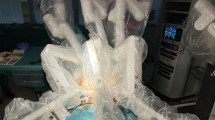Abstract
PURPOSE: To evaluate the intraoperative, postoperative, and long-term complications of an absorbable pelvic mesh sling after surgery for rectal carcinoma. METHODS: A retrospective review of medical records from April 8, 1991, through April 8, 1996. RESULTS: Twenty patients with a mean age of 57 (range, 37–79) years underwent pelvic mesh sling placement. The tumor stages were as follows: Stage I, 5; Stage II, 2; Stage III, 11; and Stage IV, 1. A recurrent perianal basal cell carcinoma was not included in the staging group. Surgery consisted of 18 abdominoperineal resections, 1 total proctocolectomy, and one Hartmann's procedure. Mean follow-up was 18 (range, 2–49) months. There were no intraoperative complications related to mesh placement. Twenty-nine complications occurred in 14 patients during the immediate postoperative period. Five were possibly mesh-related and included a pelvic abscess, perineal seroma, toxic perineal wound, pulmonary embolus, and lower extremity deep venous thrombosis, respectively. A mild postoperative ileus developed in 17 patients (85 percent), and a diet was initiated at a mean of seven (range, 4–24) days. Fourteen patients received postoperative radiotherapy with a mean dose of 5,339 (range, 2,500–7,020) cGy delivered in 180-cGy fractions. There were 14 immediate complications caused by radiotherapy in 11 patients, but only two patients required delays in treatment. Two patients had diarrhea alone, six developed perineal dermatitis alone, and three patients had both diarrhea and perineal dermatitis. All patients with diarrhea had received chemoradiation. One patient developed a partial small-bowel obstruction following radiation. CONCLUSIONS: Absorbable pelvic mesh sling placement can be performed with minimum morbidity and is recommended following surgery for rectal cancer when radiation is anticipated as part of multimodality therapy.
Similar content being viewed by others
References
Gastrointestinal Tumor Study Group. Prolongation of the disease-free interval in surgically treated rectal carcinoma. N Engl J Med 1985;312:1465–72.
Douglass HO, Moertel CG, Mayer RJ,et al. Survival after postoperative combination treatment of rectal cancer. N Engl J Med 1986;315:1294–5.
Krook JE, Moertel CG, Gunderson LL,et al. Effective surgical adjuvant therapy for high-risk rectal carcinoma. N Engl J Med 1991;324:709–15.
O'Connell MJ, Martenson JA, Wieand HS,et al. Improving adjuvant therapy for rectal cancer by combining protracted-infusion fluorouracil with radiation therapy after curative surgery. N Engl J Med 1994;331:502–7.
Letschert JG, Lebesque LV, Aleman BM,et al. The volume effect in radiation-related late small-bowel complications: results of a clinical study of the EORTC Radiotherapy Cooperative Group in patients treated for rectal carcinoma. Radiother Oncol 1994;32:116–23.
Tang R, Wang J, Chen J,et al. Postoperative adjuvant radiotherapy in Astler-Coller stages B2 and C rectal cancer. Dis Colon Rectum 1992;35:1057–65.
Myerson RJ, Zusag TW, Kodner IJ,et al. Adjunctive radiation therapy for rectal carcinoma. Am J Clin Oncol 1992;15:102–11.
Letschert JG. The prevention of radiation-induced small bowel complications. Eur J Cancer 1995;31A:1:361–5.
Kinsella TJ, Bloomer WD. Tolerance of the intestine to radiation therapy. Surg Gynecol Obstet 1980;151:273–84.
Frykholm GJ, Glimelius B, Pahlman L. Preoperative or postoperative irradiation in adenocarcinoma of the rectum: final treatment results of a randomized trial and an evaluation of late secondary effects. Dis Colon Rectum 1993;36:564–72.
Galland RB, Spencer J. The natural history of clinically established radiation enteritis. Lancet 1985;1:1257–8.
Devereux DF, Chandler JJ, Eisenstat T, Zinkin L. Efficacy of an absorbable mesh in keeping the small bowel out of the human pelvis following surgery. Dis Colon Rectum 1988;31:17–21.
Thom A, Baumann J, Chandler JJ, Devereux DF. Experience with high-dose radiation therapy and the intestinal sling procedure in patients with rectal carcinoma. Cancer 1992;70:581–4.
Rodier JF, Janser JC, Rodier D,et al. Prevention of radiation enteritis by an absorbable polyglycolic acid mesh sling. Cancer 1991;68:2545–9.
Dasmahapatra KS, Swaminathan AP. The use of a biodegradable mesh to prevent radiation-associated small bowel injury. Arch Surg 1991;126:366–9.
Trimbos JB, Snijders-Keilholz T, Peters AW. Feasibility of the application of a resorbable polyglycolic-acid mesh (dexon mesh) to prevent complications of radiotherapy following gynaecological surgery. Eur J Surg 1991;157:281–4.
Sloan DA. Complete small bowel obstruction in the early postoperative period complicating surgical sling procedure. Am Surg 1994;60:282–6.
Rothenberger DA, Wong WD. Abdominoperineal resection for adenocarcinoma of the low rectum. World J Surg 1992;16:478–85.
Farid H, O'Connell TX. Methods to decrease the morbidity of abdominoperineal resection. Am Surg 1995;61:1061–4.
Petrelli NJ, Nagel S, Rodriguez-Bigas M, Herrera L. Morbidity and mortality following abdominoperineal resection for rectal adenocarcinoma. Am Surg 1993;59:400–4.
Author information
Authors and Affiliations
About this article
Cite this article
Beitler, A., Rodriguez-Bigas, M.A., Weber, T.K. et al. Complications of absorbable pelvic mesh slings following surgery for rectal carcinoma. Dis Colon Rectum 40, 1336–1341 (1997). https://doi.org/10.1007/BF02050819
Issue Date:
DOI: https://doi.org/10.1007/BF02050819




